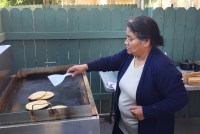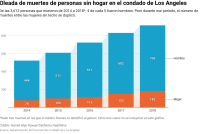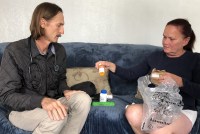Latest Morning Briefing Stories
Must-Reads Of The Week From Brianna Labuskes
Newsletter editor Brianna Labuskes wades through hundreds of health care policy stories each week, so you don’t have to.
Calor extremo y violencia, más amenazas para los que esperan asilo en la frontera
Ya no son hombres solos en busca de trabajo. Familias enteras buscan asilo en los Estados Unidos, y deben esperar en refugios atestados y zonas de violencia al sur de la frontera.
Heat And Violence Pose Twin Threats For Asylum-Seekers Waiting At Border
For Central American migrants who follow U.S. government rules for pursuing asylum, conditions on the Mexican side of the border are sweltering, filled with anxiety and illness. Few people have a clear timetable for when it will get any better.
For Civilians, Finding A Therapist Skilled In PTSD Treatments Is A Tough Task
Many therapists are not familiar with two key treatment options for trauma recommended by the American Psychiatric Association and the Department of Veterans Affairs.
Escalada de violencia contra trabajadores de salud conmociona a los hospitales
Presionan a centros de salud a tomar más medidas de seguridad para prevenir una forma de violencia que ha sido considerada por largo tiempo como “parte del trabajo”.
Why Missouri’s The Last Holdout On A Statewide Rx Monitoring Program
For the seventh year in a row, Missouri will retain its lonely title as the only state without a statewide prescription drug monitoring program. Fears about privacy violations and gun control scuttled the bill yet again, leaving a pastiche of half-step measures in place to fill the void in the fight against prescription drug abuse.
Escalating Workplace Violence Rocks Hospitals
Incidents of serious workplace violence are four times more common in health care than in private industry, according to the Occupational Safety and Health Administration.
Meth Vs. Opioids: America Has Two Drug Epidemics, But Focuses On One
In the West and Midwest, 70% of local law enforcement says meth is the bigger threat. It’s also a more difficult addiction to treat.
El largo y sinuoso camino para conseguir atención de salud mental infantil
Los Estados Unidos se enfrentan a una creciente escasez de profesionales de salud mental capacitados para trabajar con jóvenes, en un momento en que la depresión y la ansiedad están en aumento.
Readers And Tweeters Parse Ideas — From Snakebites To Senior Suicide
Kaiser Health News gives readers a chance to comment on a recent batch of stories.
The Long And Winding Road To Mental Health Care For Your Kid
A growing mental health crisis among children is exacerbated by a national shortage of child psychiatrists and therapists. It’s either difficult to get, or to afford, an appointment for your child. Here’s some advice that might help.
Grupos denuncian atención médica y de salud mental deficiente a los detenidos por ICE
Grupos de derechos civiles denuncian que los inmigrantes detenidos en un centro de Adelanto, California, no reciben el urgente cuidado médico y mental que necesitan.
Must-Reads Of The Week From Brianna Labuskes
Newsletter editor Brianna Labuskes wades through hundreds of health care policy stories each week, so you don’t have to.
El legado de María: estudiantes en Puerto Rico sufren de estrés post traumático
Casi el 46% dijo que su casa estaba dañada. Más del 32% experimentó escasez de alimentos y agua. Y aproximadamente el 58% informó que un amigo o miembro de su familia se había ido de la isla.
Hurricane Maria’s Legacy: Thousands Of Puerto Rican Students Show PTSD Symptoms
A survey of more than 96,000 students finds that 7.2% reported “clinically significant” symptoms of post-traumatic stress disorder, according to a study in JAMA Network Open.
Aumentan las muertes de personas sin hogar en las calles de Los Ángeles
Un análisis de Kaiser Health News de datos oficiales muestra que las muertes han aumentado un 76% en los últimos cinco años, superando el crecimiento de la población sin hogar.
The Homeless Are Dying In Record Numbers On The Streets Of L.A.
Deaths of homeless people in Los Angeles County have jumped 76% in the past five years, outpacing the growth of the homeless population, according to a Kaiser Health News analysis of the coroner’s data. Experts say drug and alcohol abuse are significant factors.
Watchdogs Cite Lax Medical And Mental Health Treatment Of ICE Detainees
The Adelanto ICE Processing Center houses nearly 2,000 people in California. Federal, state and watchdog reviews say the Florida-based firm that runs the facility fails to provide adequate health care.
Lethal Plans: When Seniors Turn To Suicide In Long-Term Care
In a nation where the suicide rate continues to climb, such deaths among older adults are often overlooked. A six-month investigation by KHN and PBS NewsHour finds that older Americans are quietly killing themselves in nursing homes, assisted living centers and adult care homes.
Mourning Paradise: Collective Trauma In A Town Destroyed
The depth of psychological damage after the fire in Paradise, Calif., may depend on how much help residents are getting now.





















